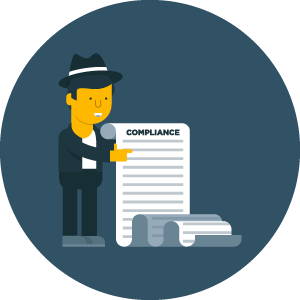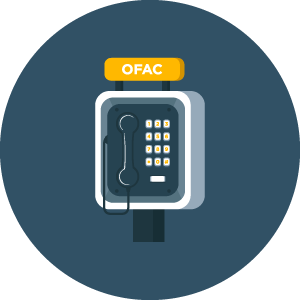Talk to Sales: (401) 200-6026
Total automotive compliance = #dealershipgoals
Back in the day, auto salespeople had it pretty easy. Sure, there was still pressure to sell and please customers, but they weren’t bogged down by compliance laws. Today, and especially over the last 25 years, automotive compliance has become paramount in the industry. Keeping track of all the legislation and requirements can be overwhelming, but just remember that these rules were put in place for a reason—and if you want to stay in business, you need to do your very best to protect your customers, employees, and dealership.
If you’re currently running a successful dealership, you’ve hopefully got a handle on any potential compliance issues. However, it can’t hurt to make sure—try some of these strategies to make sure your automotive compliance game is on point.
6 Automotive compliance strategies to keep your dealership on the right side of the law
 1. Hire a compliance officer
1. Hire a compliance officer
Every single person who works in your dealership should understand the rules of automotive compliance, but they’re all also doing other jobs as well. The best way to ensure things are being done the legal way? Hire a compliance officer—someone whose sole purpose in your dealership is to oversee and enforce total compliance. Instead of juggling a million different things and hoping you won’t get in trouble, pass responsibility on to a trained professional who will protect your business.
Learn how to write a compliance officer job description here.
2. Know the CAN-SPAM Act rules
E-mail has become a preferred marketing tool for many dealerships around the country—it’s just so easy to write up some quick promotional copy, hit send, and know your message is going directly to potential customers! Unfortunately, it’s not quite that easy, and there are still too many dealers that don’t understand that permission e-mail marketing is a thing and there are rules to follow under the CAN-SPAM Act. Don’t send another e-mail advertisement out to your mailing list before you brush up on what’s allowed—and what’s not.
Read more about the CAN-SPAM Act here.
3. Update your privacy notice
If your auto dealership provides credit, gives financial advice, or arranges financing and leasing, don’t disregard your obligations under the Gramm-Leach-Bliley Act. You’re required to provide customers with a privacy notice that describes your dealership’s privacy policies and practices. It must contain specific information, like categories or information collected and disclosed; it should be given to anyone who gives you personal information in connection with a potential transaction, and you plan on sharing that information with a nonaffiliated third party. Take a look at your privacy notice this week to make sure it’s up to snuff.
Read more about the Gramm-Leach-Bliley Act here.
 4. Have the OFAC hotline number handy
4. Have the OFAC hotline number handy
Since 9/11, auto dealerships are required to check potential buyers against a list of possible threats to national security maintained by the Office of Foreign Assets Control (OFAC). More often than not, you’re not going to find your customers on that list. However, if you end up with a someone who could be a match to an individual on the list, you’ll want to call the OFAC hotline at 1-800-540-6322 to be 100 percent sure. If the person is on the list, and you do business with them, you could be in big trouble.
Learn more about your OFAC compliance obligations here.
5. Review your identity theft protection program
 The Red Flag Rule, enforced by the Federal Trade Commission (FTC), protects consumers and businesses from identity theft. Because your dealership plays a role in securing financing for customers, you must follow the Red Flag Rule. A major part of this rule is following a four-step process to create an identity theft protection program, and then enforcing that program. Identity thieves are changing their tactics all the time, so take a look at your current program and see if anything needs to be adjusted or updated to ensure automotive compliance.
The Red Flag Rule, enforced by the Federal Trade Commission (FTC), protects consumers and businesses from identity theft. Because your dealership plays a role in securing financing for customers, you must follow the Red Flag Rule. A major part of this rule is following a four-step process to create an identity theft protection program, and then enforcing that program. Identity thieves are changing their tactics all the time, so take a look at your current program and see if anything needs to be adjusted or updated to ensure automotive compliance.
Read more about the Red Flag Rule here.
6. Make spot delivery the exception, not the rule
When you’re so close to making the sale, but the financing comes back as “pending,” you may be tempted to send the customer home with the car in hopes that the financing will clear in the morning and you’ll keep your sale. After all, if you didn’t allow spot delivery, you might lose your customer when they go to the dealership down the street. The FTC has its eye on deceptive spot delivery tactics—yo-yo financing—and the penalties may not make it worth it to even try sometimes. Instead of allowing spot delivery to happen regularly, tell your salespeople to reserve it for customers they’re 99.9% sure will be cleared for financing.
Learn more about yo-yo financing here.
Don’t fight automotive compliance. If you embrace the law and work with it, not against it, you’ll soon find yourself with a dealership and team you can be proud of.
Are you on the hunt for an automotive CRM that will assist you with some of your compliance goals and need tips and tricks for finding and evaluating the right one? Download our FREE guide.
Interested in an Affordable, Full-Featured Auto Dealer CRM?
Schedule an AutoRaptor Demo Now!





